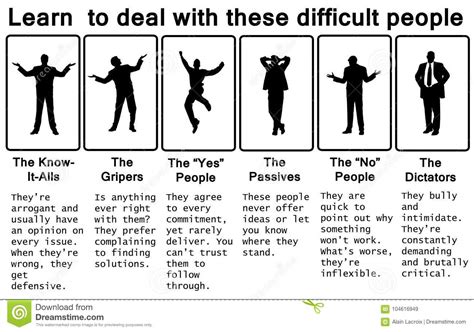Dealing With Difficult Co-Workers: 12 Effective Strategies

Working with difficult co-workers can be a challenging and stressful experience. Whether it’s a colleague who constantly criticizes your work, a team member who refuses to cooperate, or a supervisor who micromanages every task, navigating these relationships can greatly impact your job satisfaction and overall well-being. However, there are effective strategies you can employ to deal with difficult co-workers and maintain a positive work environment.
1. Maintain Professionalism
When faced with a difficult co-worker, it’s important to maintain professionalism at all times. Avoid engaging in arguments or getting defensive, as this can escalate the situation and create a toxic work environment. Instead, focus on staying calm, composed, and respectful in your interactions.
2. Communicate Effectively
Effective communication is key when dealing with difficult co-workers. Clearly express your thoughts, concerns, and expectations in a professional manner. Listen actively to their perspective and try to find common ground or compromise. Avoid making assumptions and seek clarification when needed.
3. Set Boundaries
Setting boundaries is essential when dealing with difficult co-workers. Clearly define your limits and communicate them assertively. Let your co-worker know what behaviors are unacceptable and how they impact your work. Be firm in enforcing these boundaries and seek support from your supervisor or human resources if necessary.
4. Practice Empathy
Try to understand your difficult co-worker’s perspective and motivations. They may be dealing with personal or professional challenges that contribute to their behavior. Show empathy and try to find common ground. This can help build rapport and foster a more positive working relationship.
5. Seek Support
If you’re struggling to deal with a difficult co-worker on your own, don’t hesitate to seek support. Talk to a trusted colleague, supervisor, or human resources representative about the situation. They can provide guidance, mediation, or resources to help address the issue effectively.
6. Focus on Solutions
Avoid dwelling on the negative aspects of the situation and instead focus on finding solutions. Identify the underlying issues causing the difficult behavior and brainstorm potential solutions. Collaborate with your co-worker to implement these solutions and monitor progress.
7. Practice Self-Care
Dealing with difficult co-workers can be emotionally draining. It’s important to prioritize self-care to maintain your well-being. Engage in activities that help you relax and recharge outside of work. Practice stress management techniques such as exercise, meditation, or talking to a therapist if needed.
8. Document Incidents
Keep a record of any incidents or interactions with your difficult co-worker. Document dates, times, and details of each incident, including any witnesses. This documentation can serve as evidence if you need to escalate the situation to your supervisor or human resources.
9. Seek Mediation
If the situation does not improve despite your efforts, consider seeking mediation. A neutral third party can help facilitate a productive conversation and find a resolution that benefits both parties. Mediation can be a valuable tool in resolving conflicts and improving working relationships.
10. Build a Supportive Network
Developing a supportive network of colleagues can greatly help when dealing with difficult co-workers. Surround yourself with positive and like-minded individuals who can provide encouragement, advice, and perspective. This network can provide a safe space to vent frustrations and seek guidance.
11. Practice Conflict Resolution
Conflict resolution skills are essential when dealing with difficult co-workers. Learn and practice techniques such as active listening, reframing, and finding win-win solutions. These skills can help de-escalate conflicts and foster a more harmonious work environment.
12. Know When to Escalate
If despite your best efforts, the situation with your difficult co-worker remains unresolved and continues to negatively impact your work, it may be necessary to escalate the issue. Consult your supervisor or human resources department to discuss further steps, such as formal complaints or transfers.
Conclusion
Dealing with difficult co-workers is a common challenge in the workplace. By maintaining professionalism, practicing effective communication, setting boundaries, and seeking support, you can navigate these relationships more effectively. Remember to prioritize self-care and document incidents when necessary. With the right strategies and mindset, you can create a positive work environment and maintain your well-being.
Frequently Asked Questions
-
How can I deal with a co-worker who constantly criticizes my work?
When faced with a co-worker who constantly criticizes your work, it’s important to stay calm and professional. Listen to their feedback and consider if there is any validity to their comments. If the criticism is unwarranted, calmly and assertively communicate your perspective and provide evidence of your work’s quality.
-
What can I do if a co-worker refuses to cooperate?
If a co-worker refuses to cooperate, it’s important to address the issue directly. Communicate your expectations clearly and express how their lack of cooperation affects the team’s goals. If the behavior continues, involve your supervisor or human resources to mediate the situation.
-
How do I handle a supervisor who micromanages every task?
When dealing with a micromanaging supervisor, it’s important to communicate your need for autonomy and trust. Provide regular updates on your progress and involve them in important decisions to alleviate their need for control. If the micromanagement persists, seek support from your human resources department.
-
How can I prevent difficult co-workers from affecting my mental well-being?
Preventing difficult co-workers from affecting your mental well-being requires prioritizing self-care. Engage in stress management techniques such as exercise, meditation, or talking to a therapist. Surround yourself with a supportive network of colleagues who can provide encouragement and advice.
-
When should I escalate the issue with my difficult co-worker?
If despite your best efforts, the situation with your difficult co-worker remains unresolved and continues to negatively impact your work, it may be necessary to escalate the issue. Consult your supervisor or human resources department to discuss further steps, such as formal complaints or transfers.
